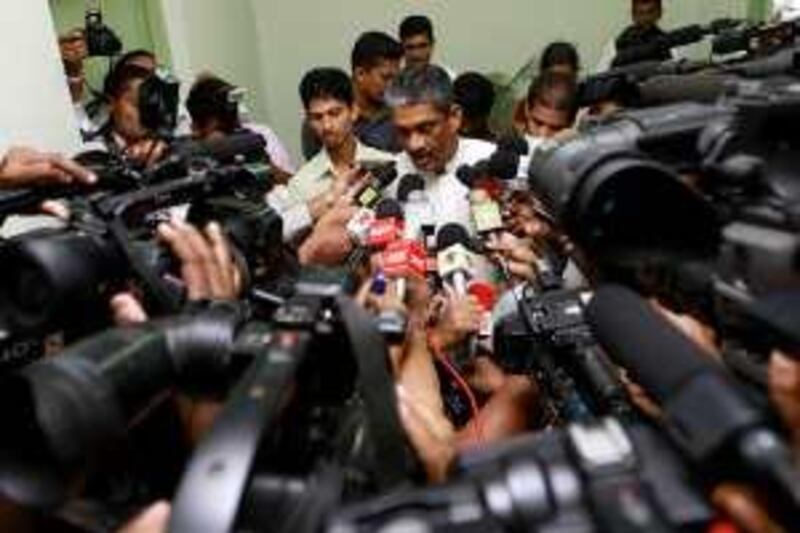COLOMBO // Sri Lanka's elections commissioner, Dayananda Dissanayake, has dashed the hopes of many Sri Lankans who are convinced that poll fraud and rigging cost the opposition candidate, Sarath Fonseka, victory at last week's presidential poll.
At a news conference yesterday, Mr Dissanayake - who stunned the nation the day after the January 26 poll by saying, "I was under a lot of pressure and couldn't even protect the ballot boxes" - did a U-turn saying there were no problems in the counting of the ballots and the polling itself was peaceful. "The poll was free and fair and I didn't receive any serious complaints. There was an unprecedented amount of rumours," he said, countering claims by Mr Fonseka and his supporters that poll fraud had robbed them of certain victory. The election was won by the incumbent, Mahinda Rajapaksa, who secured 57 per cent of the votes against Mr Fonseka's 40 per cent.
The poll was expected to end in a close finish with the edge going to Mr Rajapaksa, but his sweeping victory triggered claims from the defeated candidate that the vote count had been manipulated at the point of the computer tabulation. The opposition also made claims that government supporters intimidated voters and polling officials. Many Sri Lankans in the capital believe intimidatory tactics prevented Mr Fonseka, a former army commander, from winning. He had campaigned on bringing about a clean administration and stopping corruption and mismanagement, widely blamed on the president and his three brothers who all hold influential government positions.
"Everyone I spoke to in Colombo and in my hometown of Galle [in the south] was voting for the general," said Sanath Lokuge, a gym instructor in Colombo. "I can't believe this. There has been some major fraud in the result." The about-turn by the elections commissioner shocked many. Jehan Perera, a political commentator for the English-language Daily Island newspaper, said: "When he announced the results, Mr Dissanayake said he was under enormous pressure from various people and couldn't do his job properly. Now he is saying something different.
"The election result itself is unbelievable, for everyone I spoke to in Colombo was convinced that Fonseka will win." Mr Fonseka also lost the Colombo district to the president. Supporters of Mr Fonseka and other national political parties, including the main opposition United National Party, took to the streets yesterday claiming election fraud. Mr Fonseka has refused to accept the result and at a press conference on Tuesday called himself the "people's president", promising to challenge the decision in court. Under current rules, the election can be challenged within 21 days of the poll.
Government accusations that Mr Fonseka and his team, mostly retired army officers, were planning a military coup grew yesterday. The authorities detained several serving and retired officers, sent some on compulsory retirement and effected sweeping changes in the army. The defence secretary, Gotabhaya Rajapaksa, told BBC television on Tuesday that if the general has committed an offence, he would be legally punished.
"He has said many things publicly during the campaign which are military secrets and of a confidential nature. That is wrong," said Mr Rajapaksa, the younger brother of the president, waving his hands angrily. Dozens of soldiers cordoned off the hotel in Colombo where Mr Fonseka and other political leaders stayed on election day, raising fears that he would be arrested. The stand-off continued for many hours until Mr Fonseka left the hotel.
Further, the speed with which more than 40 changes to the senior military establishment were made surprised many. And attacks on the media have raised concerns over another bout of media-bashing by the media-sensitive government. Sunil Jayasekera, the secretary of the Free Media Movement, Sri Lanka's biggest media defence group, said: "Some media workers have been assaulted, while some journalists are in hiding."
He said one journalist disappeared the day before the poll, while the editor of a news website called LankaEnews is in hiding after the authorities blocked the site. "Several websites had been blocked, the Sinhala-language Lanka newspaper editor was arrested while the newspaper was sealed by police. However, the newspaper reopened on Tuesday after the management won a court order," Mr Jayasekera said, adding that eight media organisations urged the government to stop the harassment.
Residents in Colombo, many of whom voted for Mr Fonseka, said they have doubts as to whether the president won cleanly. "Something has happened," said Ranjit, an accountant from Colombo who gave only one name for fear of retribution from the authorities. "I don't know what. But - this election was not clean." foreign.desk@thenational.ae





